Tsubota Laboratory, Inc. (hereinafter Tsubo Lab) is a startup from Keio University engaged in developing revolutionary solutions for myopia, dry eye, presbyopia, and brain function deterioration with “Through VISIONary INNOVATION, create a GOKIGEN future” in its mission statement. Sumitomo Dainippon Pharma Co., Ltd. (hereinafter Sumitomo Dainippon Pharma), in collaboration with Tsubo Lab, is working to develop “violet light-emitting eyeglass frame” as a device that applies violet light* to both eyes of the wearer to have positive effects on the brain.
*Violet light: A sunlight component having wavelengths of 360-400 nanometers. It has longer wavelengths than ultraviolet light and is visible to the human eye.
Tsubo Lab possesses knowledge about violet light technology that has been nurtured through research into suppression of myopia progression, and about the “photoreceptor protein” OPN5, and owns the patent for the eyeglass-type violet light emitting device. By combining these achievements with Sumitomo Dainippon Pharma’s long-nurtured knowledge about drug R&D in the psychiatric and neurology fields, as well as their other frontier business assets, including the brain wave project, Sumitomo Dainippon Pharma and Tsubo Lab are committed to put the medical devices and healthcare devices (non-medical devices) into practical use.
Tsubo Lab believes violet light technology becomes an effective and safe treatment to help resolve issues related to depression and dementia worldwide. Current treatments for depression and dementia sometimes create problems such as an adverse drug reactions and the patient’s adherence to comply with the specified regimen. Therefore, the treatment with the violet light-emitting eyeglass frame is expected to overcome these issues.
In this article, we introduce the violet light-emitting eyeglass frame which will be launched as a device to treat depression and dementia with high safety and a low risk of side effects.
Issues of Depression and Dementia in Japan
Estimated Number of Patients with Dementia in Japan and the Framework for Promotion of Anti-Dementia Measures
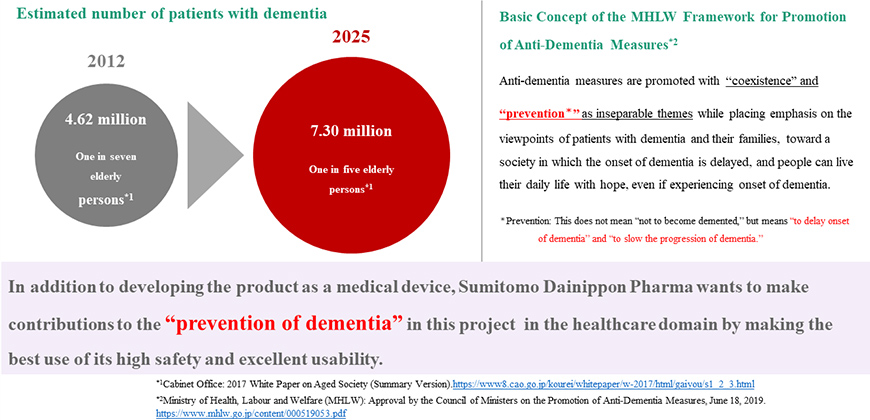

According to Japan’s Cabinet Office, there were 4.62 million patients with dementia in the country in 2012, and this number is expected to reach 7.30 million in 20251). To cope with this issue, the Ministry of Health, Labour and Welfare has advocated “Coexistence” and “Prevention” as inseparable themes in the “Framework for Promotion of Anti-Dementia Measures”2). As such, “Prevention” implies the creation of a society in which demented persons can live their lives with hope while delaying the progression of dementia.
According to a survey conducted by Japan’s Ministry of Health, Labour and Welfare, the number of patients with depression in the nation is estimated to be 0.957 million3). In addition, the social cost from depression in Japan is estimated to amount to approximately 3.1 trillion yen per year, and about half the total, 1.5 trillion yen, is estimated to have been imposed due to depression-related labor productivity reductions4).
Number of Patients with Depression, and Depression-related Costs in Japan
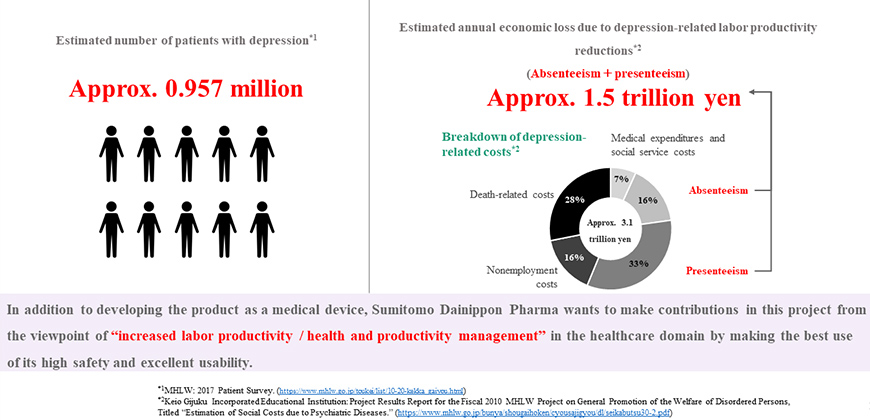

Labor productivity reductions can be caused by depression, including presenteeism, i.e., “poor work performance due to physical and mental health issues despite attendance at work,” and absenteeism, i.e., “inabilities to perform occupational duties due to physical and mental deconditioning, such as tardiness and leaving early, nonattendances, and suspensions.”
With this background, Tsubo Lab and Sumitomo Dainippon Pharma place emphasis not only on initiation of treatment after onset, but also on preventive measures for dementia and depression. There is a need for safe and routinely implementable preventive measures with excellent usability in the healthcare field.
Focusing on the “Structure of the Eye”
What Is Violet Light?
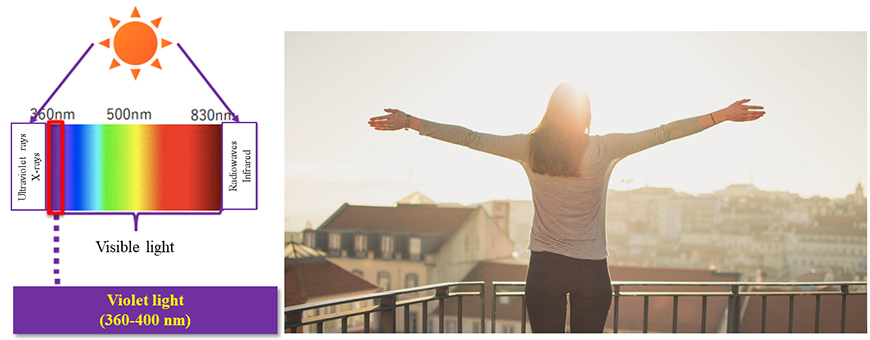
Violet light is the component of sunlight adjacent to ultraviolet rays, having a wavelength range of 360-400 nanometers. It has the shortest of the wavelength bands of visible light and a purple color. Ultraviolet light is invisible to the human eye, whereas violet light is visible.
Tsubo Lab started to focus on violet light through myopia research. While there is a popular hypothesis of “myopia occurs in children who do not play outdoors,” they discovered that the photoreceptor OPN5 which is activated primarily by violet light is associated with this activity. It was also demonstrated that stimulating OPN5 improved eye blood flow and prevented progression of myopia5).
The human body has nine photoreceptors, of which four are visual photoreceptors. Specifically, OPN1 cells are photoreceptors for color perception, detecting “blue, green, and red,” and OPN2 is a photoreceptor that detects light in dark places such as under starlight.
Photoreceptors
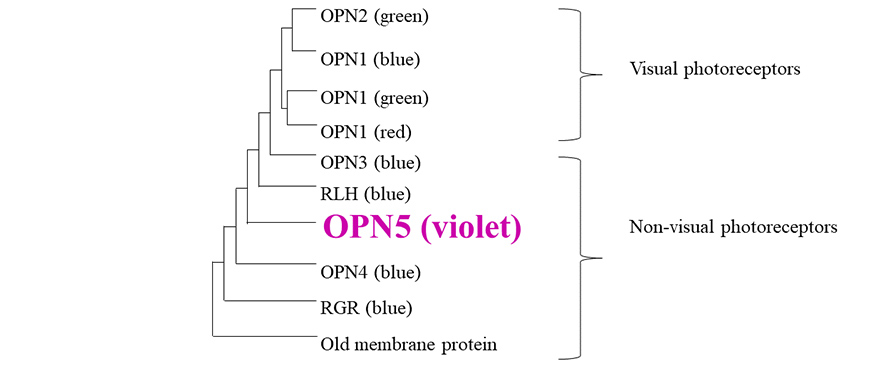
In addition, there are five non-visual photoreceptors in the human body, just as the sunflower grows toward sunlight despite the lack of eyes. These photoreceptors include OPN4, which is commonly known to be sensitive to “blue light.” For example, it is well known that “human’s biological clock is being affected negatively when exposed to blue light at nighttime, and results in causing sleep disturbance.”
Among the non-visual photoreceptors are OPN5 cells. This photoreceptor is known to be stimulated mainly by violet light. An in-vivo study conducted by Tsubo Lab demonstrated that the irradiation of violet light activated the function of the hypothalamus and other brain areas by stimulating OPN5 in the retina. In other words, violet light works directly on the brain via OPN5.
Developing Products Based on Violet Light
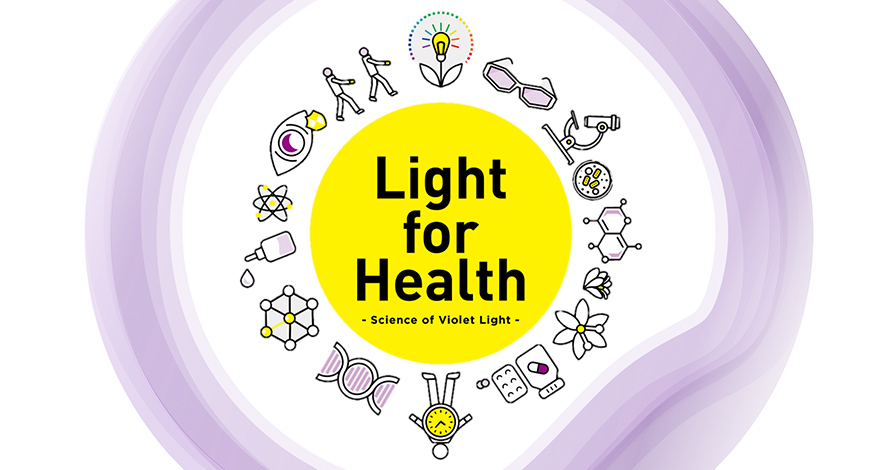
With the understanding of the eye structure in mind, Tsubo Lab is promoting a “Light for Health” campaign using violet light. Tsubo Lab is working to commercialize their research reports and achievements, including the effects of violet light in “changing body temperature” and “improving eye blood flow.” Hence, they endeavor to deepen traditional knowledge that “sun exposure is good for the body,” seeking new methods for the promotion of health.
Tsubo Lab has been verifying the relationship between OPN5 and depression, dementia, sleep disorders, and various other diseases which are currently increasing. For example, in experiments using mice, it has been clarified that exposure to violet light reduced the substance thought to be the cause of Alzheimer’s disease, and also suppressed the deterioration of memory in aged mice6). Another study found ameliorations of depressive symptoms in violet-light-exposed mice6).
The COVID-19 pandemic has lessened the opportunities for people to go outside and exercise. In this situation, there is a concern about the possible increase in the numbers of patients with various diseases such as diabetes, obesity, myopia, depression, and dementia, and Sumitomo Dainippon Pharma wants to resolve these issues by making the best use of the findings on violet light that have been discovered by Tsubo Lab.
Demonstrating Efficacy and Safety, Then Market Release as a Medical Device
The violet light emitting eyeglass frame under development has the same design features as ordinary eyeglass frames. When it is worn, LEDs on the inner side of frame emit violet light to eyes for a few hours a day. The wearer can go about their daily life without feeling any discomfort, because violet light is barely visible to the human eye. In addition, good adherence is expected thanks to the simple operation of the device, just wearing the eyeglass device.
In April 2019, Tsubo Lab conducted a clinical study in which elementary schoolchildren wore the device (study title: Exploratory Clinical Trial, Randomized, Double-Blind, Pseudo-Placebo-Controlled, Parallel-Group Study to Evaluate the Safety and Efficacy of TLG-001 in Subjects with Myopic School Children) and confirmed the safety of a medical device in suppressing the progression of myopia based on the violet light technology.
Tsubo Lab believes violet light technology is highly safe as it is part of sunlight and Homo sapiens, who were originally born and active outdoors, have been exposed to it in life. In addition, Sumitomo Dainippon Pharma appreciates their strategy which is quite a unique approach, as it treats and prevents various diseases through brain-mediated action by stimulating humans who live in modern society (who have fewer opportunities for sun exposure than those in the past) with the violet light abundantly contained in sunlight.
Expectations for Synergistic Effects with “Wearable Encephalograph” etc.
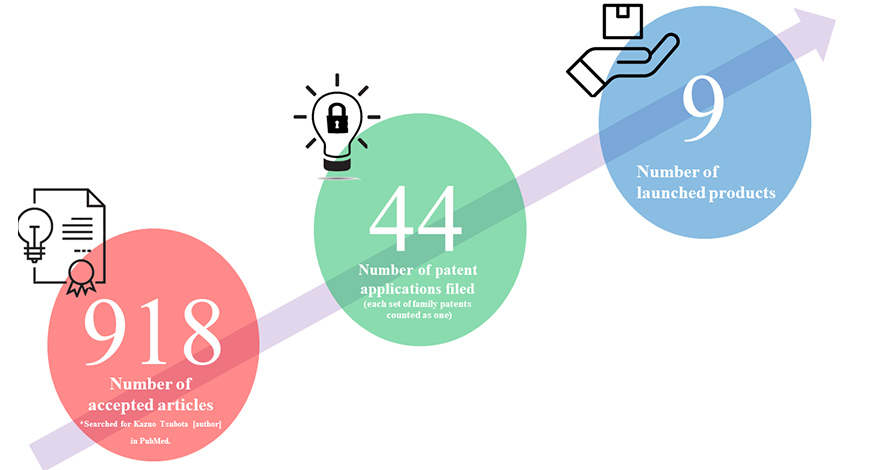
Violet light has the potential as a safe and effective treatment for psychiatric diseases such as depression and dementia. Research conducted by Kazuo Tsubota, CEO of Tsubo Lab, has yielded 918 published articles on various technologies so far, leading to 44 patent applications and market launches of 9 products by Tsubo Lab.
The joint research between Tsubo Lab and Sumitomo Dainippon Pharma is ongoing. The development of the pilot device which emits violet light for investigational use was completed last year. The upcoming schedule is as follows: Sumitomo Dainippon Pharma will assess the results from a nonclinical study in a joint research project and an independent clinical study lead by Tsubo Lab to make the Go/No-Go decision, and if a Go decision is made, Sumitomo Dainippon Pharma will proceed to the next phase for a joint development agreement and initiate a clinical trial.
Synergistic effects with other projects, such as monitoring the effect of violet light on the brain using Sumitomo Dainippon Pharma’s “wearable encephalograph,” are also expected. We believe that if we can provide a service that proposes the optimal usage of violet light according to individual lifestyles, not just as a device that emits violet light, we can contribute to people’s health even more.
In addition, at the Frontier Business Office of Sumitomo Dainippon Pharma Co., Ltd., we are endeavoring to conduct research and development for new values and business by combining our knowledge that has been compiled through R&D activities for pharmaceuticals for neuropsychiatric diseases and unique technologies, findings, and patents from our business partners. Please contact us to discuss your wishes and potential for collaboration as our business partner.
< Data Sources >
- 1)Cabinet Office: 2017 White Paper on Aged Society (Summary Version).(https://www8.cao.go.jp/kourei/whitepaper/w-2017/html/gaiyou/s1_2_3.html)
- 2)Ministry of Health, Labour and Welfare (MHLW): Approval by the Council of Ministers on the Promotion of Anti-Dementia Measures, June 18, 2019.(https://www.mhlw.go.jp/content/000519053.pdf)
- 3)MHLW: 2017 Patient Survey.(https://www.mhlw.go.jp/toukei/list/10-20-kekka_gaiyou.html)
- 4)Keio Gijuku Incorporated Educational Institution: Project Results Report for the Fiscal 2010 MHLW Project on General Promotion of the Welfare of Disordered Persons Titled “Estimation of Social Cost due to Psychiatric Diseases.”(https://www.mhlw.go.jp/bunya/shougaihoken/cyousajigyou/dl/seikabutsu30-2.pdf)
- 5)Keio University School of Medicine: “Discovery of Suppression of Myopia Progression by Violet Light, Which Is Lacking in Modern Society—Violet Light to Suppress Myopia Progression,” December 26, 2016.(https://www.keio.ac.jp/ja/press-releases/files/2016/12/26/161226_2.pdf)
- 6)Nobunari Sasaki et al., “Violet light modulates the central nervous system to regulate memory and mood,” BioRxiv, 2021(https://www.biorxiv.org/content/10.1101/2021.11.02.466604v1)
Contact us
-
Inquiry Form
-
Tokyo, JAPAN
Frontier Business Office
Sumitomo Pharma Co., Ltd.
Tokyo Nihombashi Tower,
2-7-1, Nihonbashi, Chuo-ku,
Tokyo 103-6012, Japan
Reception: 7th Floor -
Cambridge, USA
Frontier Business Office
Sumitomo Pharma America, Inc.